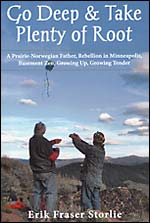
Erik Storlie - BeginnerZen.com
Erik F. Storlie is the author two outstanding books about Zen and his fifty years of practicing and teaching meditation.
To Understand The Uniquely American Experience Of Zen, Just Go Deep And Take Plenty Of Root
Minneapolis, MN, October 28, 2013 – In many ways, the practice of Eastern meditation meets its antithesis in traditional American culture. That’s why early readers find Go Deep and Take Plenty of Root: A Prairie-Norwegian Father, Rebellion in Minneapolis, Basement Zen, Growing Old, Growing Tender by Erik Storlie such a gripping experience.
Storlie tells his story of the rebellion in the sixties that led to widespread meditation practice in America. Here we experience the underground Beat scene in Minneapolis that inspired the early Bob Dylan. We meet the poets Robert Bly and James Wright. Finally, we share the author’s struggle to transmute psychedelic explorations into Zen and mindfulness – and to become a loving son, father, and husband.
“Cultivation of the human mind and body in the quiet, open awareness of meditation is deeply satisfying,” says author Erik Storlie. “We touch the strange wonder of this existing universe and the moment by moment arising of our human consciousness. We can practice this whether we are famous or obscure or something in between. And we can bring that satisfaction into our everyday lives of work, friends, and family.”
Critics have called Storlie’s most recent book “a treasure.” Pagan Kennedy, author of The Dangerous Joy of Dr. Sex and Other True Stories, comments: “In Erik Storlie's remarkable memoir, he takes us on a mad tour of Secret Minnesota—and this is not Garrison Keillor’s Lake Wobegon. I loved discovering Storlie's Midwestern beatnik paradise, a place where Bob Dylan and the poet James Wright might show up at the next party. Storlie was one of the original Minneapolis mystics; he searched for the ecstatic, the illegal, and the unspeakable in the bars of Dinkytown. What he found will delight the reader.”
And from Chard deNiord, author of Sad Friends, Drowned Lovers, Stapled Songs, Reflections and Conversations with Twentieth Century American Poets, who says: “Reads like a novel…with a sprezzatura comparable to On the Road…fresh, firsthand accounts of Storlie’s turbulent, romantic, experimental, literary days…an essential witness to both hurt and ecstasy out of which so much genius emerged…”
Erik Storlie’s first memoir, Nothing on My Mind: Berkeley, LSD, Two Zen Masters (Shambhala 1996), describes the upsurge of interest in psychedelics and Zen in San Francisco, his struggle to integrate the psychedelic experience with meditation, and his study and practice with Shunryu Suzuki and Dainin Katagiri Roshis. He completed a PhD in American Studies and taught for thirty-five years at an inner-city college in Minneapolis. He now teaches meditation and mindfulness and leads retreats for the Center for Spirituality and Healing at the University of Minnesota.
- NEWS UPDATE: I Heart Radio interview about Erik's new book. Unplugged And Totally Uncut: Author Eric Storlie by Arroe Collins, 2013-11-08
- go back to home page and other books
In Stock and Available at Amazon.com
Reviews
James P. Lenfestey, author of A Cartload of Scrolls: 100 Poems in the Manner of T'ang Dynansty Poet Han-shan: “Superb writing and deeply honest storytelling…with gorgeous and harrowing passages of love found and lost, of his hanging out at the University bars and parties…intense, mad, destructive drinking…the inside story of the arrival of the counterculture -particularly poetry, acid, Zen…from one who lived it from the inside, and who does not gild the ego.”
Michael Dennis Browne, author of Things I Can’t Tell You: “In Erik Storlie’s superbly detailed and touching memoir, we see how, by way of many tensions with both parents, and by an evolving liberating attention to their veiled individuality...he gains insights into their hidden natures and comes to an awareness of what he calls at one point ‘sorrow beyond my fathoming’….This is wonderfully tender, accurate writing, and brings us into the presences, events and relationships of one writer’s past that can enhance the present for all of us.”
Scott Edelstein, author of Sex and the Spiritual Teacher: “Erik Storlie’s previous memoir, Nothing on My Mind, recounts the arrival of psychedelics in Berkeley in the mid-1960s and his experiences with Zen teachers Shunryu Suzuki and Dainin Katagiri. He refuses formal Buddhism, convinced that America and Americans need meditation practice, but not the ceremonial and cult-like elements of Japanese Zen. Go Deep and Take Plenty of Root takes us a step further, demonstrating that Asian meditative practice can be reconciled with and can deeply infuse an American life.”
